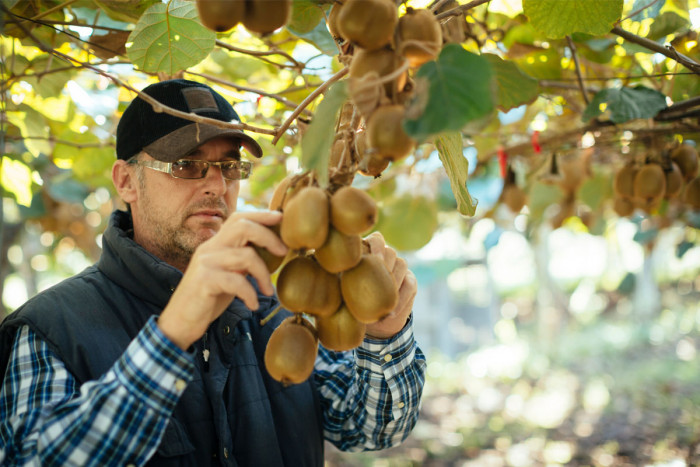Orchard Farmer/Manager
Kaipāmu Uru Hua Rākau/Kaiwhakahaere Uru Hua Rākau
Alternative titles for this job
Orchard farmers/managers plan and manage fruit and nut production in orchards.
Pay
Orchard farmers/managers with up to five years' experience usually earn
$55K-$110K per year
Orchard farmers/managers working for large organisations usually earn
$120K-$180K per year
Source: Horticulture NZ, Trade Me Jobs and Indeed, 2019.
Job opportunities
Pay
Pay for orchard farmers/managers varies depending on:
- orchard size
- orchard profitability, which may vary from season to season
- prices received for the fruit or nuts.
Orchard farmers/managers with up to five years' experience usually earn between $55,000 and $110,000 a year.
Orchard farmers/managers who work for large organisations can earn between $120,000 and $180,000.
Sources: Horticulture NZ; Trade Me Jobs; and Indeed, 2019.
(This information is a guide only. Find out more about the sources of our pay information)
What you will do
Orchard farmers/managers may do some or all of the following:
- decide what fruit or nuts to grow
- cultivate land and plan orchards
- plant trees or shrubs, and monitor growth
- ensure trees and shrubs are watered, fertilised and pruned, and are healthy
- manage irrigation and frost protection
- organise the harvesting, grading and packing of fruit or nuts, and arrange for sale and transport
- buy seed, trees, fertiliser, machinery and other orchard materials
- check, clean and maintain orchard equipment
- train, organise and supervise orchard workers and contractors
- ensure that food safety, health and safety, and other regulations are complied with
- keep production and financial records.
Skills and knowledge
Orchard farmers/managers need to have knowledge of:
- how to grow and harvest various types of fruit or nut crops
- orchard diseases, weeds and pests, and how to control them
- climate and weather conditions, and how they affect orchard production
- soil and orchard rotation, and cultivation and harvesting methods
- food safety, market certification and quality requirements
- health, safety and employment regulations
- recruiting, training and managing staff.
Working conditions
Orchard farmers/managers:
- usually work between eight and 10 hours a day, but during peak seasonal harvest and planting times may worker longer hours, including weekends
- work outdoors or in packhouses and offices
- work in all weather conditions, with machinery and chemicals that can be hazardous
- may have to travel locally between orchards and to markets or suppliers.
What's the job really like?

Daniel Thomas
Orchard Farmer/Manager
Hard work and willingness to learn important
Orchard farmer/manager Daniel Thomas says willingness to learn is important if you’re starting out.
“You might start at the bottom but if you work hard people will put the time and effort into training you. There are qualifications and experience you can have for the job that will help, but every orchard is different so it’s all about being taught on the job.”
Range of responsibilities
Daniel’s roles change throughout the year. In spring and summer he manages a 60 hectare kiwifruit orchard, planting and spraying kiwifruit. He’s also an assistant coolstore manager and manages fruit orders from clients during autumn and winter.
“I love the variety of the job. Every day is a new challenge.”
Weather-dependent industry
“Last year we had a really good growing year. Yields were the highest they’ve ever been for certain crops. It’s rewarding when you’ve tried something different and created the change.”
“There have also been devastating moments when we had hail for a few years which damaged our apple crops. The horticulture industry is a bit of a gamble in that sense.”
Daniel says you can’t do much to prevent extreme weather events, but being properly insured helps.
Orchard farmer/manager video
Elliot Eastern talks about life as an orchard operations manager 1.01 mins. (Video courtesy Apples and Pears NZ)
Each year I worked on orchards and Nelson over summer running and helping out with the harvest. Then I headed off overseas.
I worked on orchards in England and Australia, and as a dive master in Asia to fund my travels.
As part of my job is Operations Manager at Eastern apples I've travelled to Tonga and Samoa to meet our seasonal workers and the families and to see how they've used the money they've earned here.
It was amazing to see how much of a difference the money has made to these communities.
I've visited Washington State in Canada to look at the different growing systems and to get ideas to implement on our orchards.
Spending time on orchards overseas has given me a good appreciation of how lucky we are to have the great growing environment we do here, and as a result how much better apples can be.
I'm Elliot Easton, an Operations Manager for Eastern Apples, based in the Tasman region.
Entry requirements
There are no specific entry requirements to become an orchard farmer/manager as you gain skills on the job.
However, a New Zealand Certificate in Horticulture (Fruit Production) (Level 4) or a diploma or science degree in horticulture may be useful.
You can also train on the job through Primary ITO's Let's Grow horticulture apprenticeship.
A driver's licence is essential and a licence with a forklift endorsement is useful.
- Primary ITO website - horticulture apprenticeships and training
- More information about apprenticeships
Extra requirements for chemical spraying
If your job requires agrichemical spraying you need a certificate from approved providers such as Growsafe.
Secondary education
A minimum of three years of secondary education is recommended. Useful subjects include accounting, agricultural and horticultural science, business studies, maths, biology and chemistry.
For Year 11 to 13 learners, trades academies and the STAR and Gateway programmes are good ways to gain relevant experience and skills.
These programmes may help you gain an apprenticeship, but do not reduce the amount of time it takes to complete it.
Personal requirements
Orchard farmers/managers need to be:
- good administrators, with business planning skills
- good communicators and managers
- able to work well in a team and under pressure.
“You get to see the process from before the fruit starts growing to when it's in a box being shipped off. It’s really rewarding to go through the whole process and get to a finished product.”

Daniel Thomas
Orchard Farmer/Manager
Useful experience
Useful experience for orchard farmers/managers includes:
- horticulture or agriculture work
- using specialist equipment or driving heavy vehicles
- mechanical work
- business management
- working with harvesting contractors.
Physical requirements
Orchard farmers/managers need to be reasonably fit and healthy.
Find out more about training
- Horticulture New Zealand
- (04) 472 3795 - info@hortnz.co.nz - www.hortnz.co.nz
- Primary Industry Training Organisation
- 0800 208 020 - info@primaryito.ac.nz - www.primaryito.ac.nz
What are the chances of getting a job?
Growing demand for orchard farmers/managers
Demand for orchard farmers/managers is increasing as the horticulture industry continues to grow.
Orchard farmers/managers are particularly in demand because:
- there are not enough New Zealanders available to do the work
- the horticulture industry is expected to grow and increase its export revenue to over $5 billion in 2023
- orchards are getting larger and more complex, and require advanced soil and orchard management skills to achieve greater productivity.
High competition for orchard farmer/manager positions
Staff turnover is low for orchard farmer/manager positions so competition can be high when vacancies arise.
However, it can still be difficult to find suitable people for orchard manager vacancies due to lack of experience and expertise.
According to the Census, there were about 4,500 fruit and nut growers (across all horticulture sectors) working in New Zealand in 2018.
Types of employers varied
Orchard farmers/managers can work for private orchard owners, businesses or grower companies that may own one or more orchards.
Orchard farmers/managers can also be self-employed and own their own orchards.
Sources
- Finger, N, and Wilson, R, 'Permanent Labour Survey 2017 - Prepared for NZ Apples and Pears Inc', 27 July 2017.
- Horticulture NZ, 'Our Food Future: Annual Report 2019', accessed August 2019, (www.hortnz.co.nz).
- McArley, D, 'Essential Skills in the New Zealand Pipfruit Industry', Fruition Horticulture, May 2016.
- Ministry of Business, Innovation and Employment, ‘Farmers and Farm Managers', Occupation Outlook, accessed May 2019, (www.mbie.govt.nz).
- Simpson, E, capability development manager, Apples and Pears New Zealand, careers.govt.nz interview, October 4 2019.
- Stats NZ, '2018 Census Data', 2019.
- vanBeek, J, national seasonal labour coordinator, Horticulture New Zealand, careers.govt.nz interview, October 11, 2019.
(This information is a guide only. Find out more about the sources of our job opportunities information)
Progression and specialisations
Orchard farmers/managers may progress into supervisory or management roles, or buy their own orchards. They may also become horticultural consultants.
Orchard farmers/managers may specialise in growing a specific type of fruit or nut or a mixture of different fruits and nuts.
- Berry growers
- Berry growers grow and sell kiwifruit, avocados, strawberries, raspberries, blueberries, blackberries, blackcurrants and boysenberries.
- Citrus fruit growers
- Citrus fruit growers grow and sell feijoas, grapefruits, limes, lemons, mandarins and oranges.
- Drupe, stonefruit and summerfruit growers
- Drupe, stonefruit and summerfruit growers grow and sell apricots, cherries, olives, peaches, plums and nectarines.
- Nut growers
- Nut growers grow and sell chestnuts, walnuts, hazelnuts, pecans and other types of nuts.
- Pipfruit growers
- Pipfruit growers grow and sell apples and pears.
Last updated 9 May 2025

